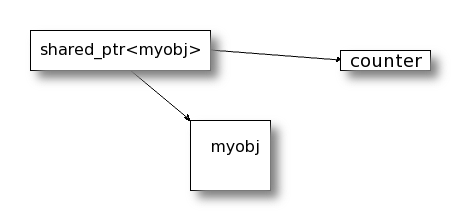Chapter 2. Reference-counted objects
Index
- Comparison with other implementations of reference-counted objects
- Objects
- Pointers and references
x::const_refandx::const_ptrcreate() - create reference-counted objects- Specifying a custom
base - Multiple inheritance and casting
- Creating an
x::refor anx::ptrfromthis - Multiple inheritance with reference-counted objects
- Private inheritance of reference-counted objects
- Comparing
x::refs andx::ptrs isa()- Weak pointers
- Reference and pointer traits
- Destructor callbacks and mcguffins
- Waiting for a cascading destructor
- Weak containers
- Circular strong references
Nearly all objects in LibCXX are reference-counted objects,
similar to what std::shared_ptr
implements, but with notable differences as described here.
In this context, this is not the same kind of a “reference”
that's a part of the C++ language itself.
For clarity, “native references” will refer to traditional
C++ references, while the general usage of the term “reference
pointer”, or a
“reference”, refers to the construct described here.
Reference-counted objects do not get
accessed with an ordinary pointer, but by using a reference
pointer, an x::ref or an x::ptr.
A reference-counted object gets instantiated in dynamic scope using
a variadic create() function that forwards its
arguments to the object's constructor;
create()
instantiates the object in dynamic scope and
creates the first, initial reference pointer to the
newly-instantiated object.
Reference pointers look like ordinary pointers. They have
* and -> operators with
the expected behavior. Reference pointers may be freely copied and
passed around.
create() replaces new.
new does not get used to construct reference-
counter object in dynamic scope, and must not be used.
Similarly, delete does not get used, explicitly, with
reference-counted objects.
When the last reference to an object goes out of scope and longer exists,
the last reference pointer takes care of destroying the object
with a delete, and invoking any
destructor callbacks.
Warning
pthread_cancel(3) cannot be used in code that uses
LibCXX. pthread_cancel(3) terminates a thread without
unwinding the stack. The stack may contain references to
reference-counted objects, or other objects
whose destructors contain critical functionality.
Using pthread_cancel(3) will result in memory leaks,
deadlocks, and other unstable behavior. This is likely to be the case with
any C++-based process of non-trivial complexity,
not just LibCXX. The only safe way to forcibly terminate the thread is
by throwing an exception that unwinds the entire stack frame.
x::msgdispatcherObj
provides a convenient message-based thread design pattern which
supplies a stop() method that sends a message to the
running thread that causes it to throw an exception and terminate, in an
orderly manner.
Comparison with other implementations of reference-counted objects
This implementation of reference-counted objects is
similar to other similar implementations, notably
shared_ptr in the C++ library, however there are
fundamental differences. The key differences are:
A
shared_ptrcontains a pointer to a small heap-allocated object that tracks the reference count, and a second pointer to the actual object:
LibCXX's reference-counted objects use a different approach that's similar to Java's implementation of managed objects. LibCXX's reference-counted objects are derived from the
x::objsuperclass, which tracks the reference count. There are two main reference pointer classes,x::refandx::ptr, holding a single pointer to the object:
shared_ptr's*and->operators dereference a mutable object, and dereferencing anullptris undefined behavior.x::ptrcan also be anullptr, but dereferencing anullptris not undefined behavior: an exception gets thrown, with defined semantics.x::ref's*and->operators do not check for anullptrbecausex::refcannot be anullptr. It always refers to an object. This is enforced by contract. Thenullptrgets checked when anx::refgets assigned to.x::refis proven, by contract, never to contain anullptr; hence its*and->directly dereferences the internal pointer to the underlying object.An
x::reflvalue is convertible to anx::ptrlvalue without a temporary. Converting anx::ptrto anx::refchecks for anullptrat the time the conversion takes place, where an exception gets thrown. Anx::ptrmay be passed to a function that takes anx::refargument. If the caller supplies anullptr, the exception gets thrown in the caller's context, for violating the contract. The backtrace accurately points to the guilty party, not the function, but its caller.x::ptrandx::refare analogous to natural C++ pointers and references. Similarly, LibCXX defines anx::const_ptrand anx::const_ref, that dereference to constant objects. This is directly analogous to astd::iteratorand astd::const_iterator. Nothing similar is available with ashared_ptr. Ashared_ptr<T>is convertible to ashared_ptr<const T>, but doing that for a function call requires the construction of a temporary. Anx::ptrlvalue converts to anx::const_ptrlvalue without a temporary, ditto forx::refand anx::const_ref.
The primary benefit of using shared_ptr
is that it allows any class to acquire reference-counting
semantics without modification. Standard C++ library classes, such as
various stream objects, can be easily wrapped into a
reference-counted framework.
However, there are several disadvantages to
shared_ptr that x::ref and x::ptr aim to address.
Each reference-counted object requires allocating another small object, the reference counter, from the heap. Over the long term, this is more likely to increase heap fragmentation, and heap usage, especially in long running applications, as reference-counted objects get created and destroyed.
make_sharedpartially mitigates this, however the end result has to be compatible with the stockshared_ptrand that introduces additional behind the scenes complexity.There is no straightforward way to prove, by contract, that a
shared_ptrinstance is not anullptr.It's not possible to construct a
shared_ptrfromthis, unless the class explicitly inherits from anenable_shared_from_thissuperclass. But this cancels outshared_ptrprimary benefit of wrapping any arbitrary class. Furthermore, this approach becomes somewhat difficult when multiple inheritance gets involved.
LibCXX stores the reference count in each object's superclass,
x::obj which is
directly accessible by any subclass. A new x::ref or an x::ptr
gets trivially constructed from this,
without much fanfare.
This creates a new reference, and increments
the object's reference count.
Furthermore, since the counter is a part of the object, it does not
need to be allocated separately, on the heap. The only drawback is that,
unlike with shared_ptr, it's not possible to
implement reference-counted semantics for an arbitrary class. It is
necessary to declare a subclass that multiply
inherits from that class, and
from x::obj.
x::refs and x::ptrs work with multiple inheritance without any special
effort. Each reference-counted class
virtually inherits from x::obj, which
automatically does the right thing when multiple reference-counted
classes get inherited from.